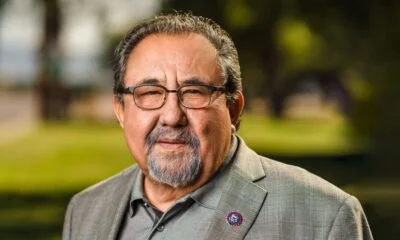Politics
Arizona Voters Face Critical Choice on Open Primaries in Upcoming Elections

PHOENIX — Arizonans are set to vote on whether to eliminate partisan primaries following a recent decision by the Arizona Supreme Court. On Friday, the court ruled against attempts to hinder the counting of votes concerning Proposition 140, which is currently featured on ballots across the state.
The court’s order came just ahead of a significant electoral deadline as ballots had already begun to roll out, necessitating their printing by late August. Despite objections from opponents claiming insufficient valid signatures on the initiative’s petitions, Judge Frank Moskowitz of Maricopa County Superior Court dismissed their requests to block the tallying of votes.
Chief Justice Ann Scott Timmer stated that the court had reviewed the arguments presented and upheld Moskowitz’s decision without indicating which specific reasoning influenced their conclusion. The full explanation from the court is anticipated in a forthcoming opinion.
If passed, Proposition 140 aims to eliminate public funding for partisan primaries, replacing it with a nonpartisan primary system. This would allow candidates from all parties, as well as independents, to compete against one another, with all registered voters able to participate, regardless of their political affiliations.
The top two candidates would make it to the general election, irrespective of party lines. The proposal also allows for up to five candidates on the ballot, potentially utilizing a ranked-choice voting system that would require voters to rank their preferences.
The opposition, represented by the Arizona Free Enterprise Club, contended that their evidence indicated a substantial number of duplicate signatures were included in the petition count. They claimed that factoring in these duplicates would diminish the number of valid signatures below the required threshold. Ultimately, Moskowitz determined that once the ballots were finalized and sent for printing, the validity of signatures was no longer subject to change.
Disappointment echoed from the Free Enterprise Club following the Supreme Court’s ruling. President Scot Mussi expressed frustration, asserting that the groups supporting the initiative misrepresented the number of valid signatures. He further accused them of deliberately delaying the review of these signatures to undermine the integrity of the electoral process.
In contrast, Chuck Coughlin, managing the campaign for Proposition 140, embraced the ruling, stating simply, “We won.” The dynamics surrounding the case reveal a significant focus on procedural rather than substantive legal interpretations.
Critically, the court’s dismissal of the challenge highlights procedural implications, including the issue of whether enough valid signatures existed. Although proponents initially submitted around 575,000 signatures, only approximately 409,474 were deemed valid by preliminary checks. Opponents had hired an external firm to audit the signatures, confirming nearly 40,000 duplicates.
However, Moskowitz evaluated the duplications against existing state laws, stating that counting removed signatures twice would constitute “double counting.” Thus, he used this rationale to dismiss the challenge. Even if the signatures were indeed insufficient, he clarified, state law did not permit halting the vote count.
Arizona Secretary of State Adrian Fontes asserted that it was too late to contest the ballot’s validity due to the imminent election timeline. Additional legal perspectives echoed this sentiment, emphasizing the need to move forward with counting the votes.
Financially, supporters of Proposition 140 have amassed over $6.9 million, including significant contributions from notable figures. Robson Walton, a former Walmart board chair, donated $600,000, while other sizable contributors like David Tedesco and Saran Smallhouse have also made substantial investments. In contrast, no financial disclosures have emerged from the initiative’s opponents, raising questions regarding transparency.

















